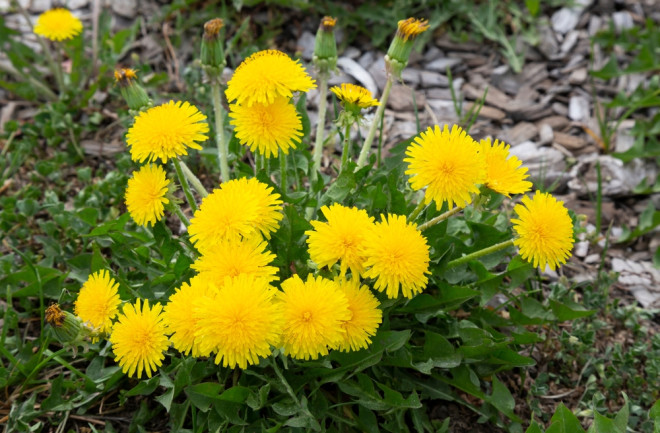Every neighborhood has that one unkempt house with an overgrown lawn no one ever seems to mow. Dandelion flowers sprout from the cracks in the pavement, and the property looks like a prairie dotted with the yellow weed.
A neighbor might see an eyesore and a homeowner’s association might see violations worthy of hefty fines. But increasingly, researchers who study nutraceuticals see the dandelion as a natural remedy with chemical compounds that can help with various ailments.
What Is Dandelion?
The word dandelion comes from the French phrase dent-de-lion (lion’s teeth) because the flower’s yellow petals resemble lion’s teeth. These yellow flowers tend to follow the sun. They open at sunrise and close at nightfall. They can also close when a rain storm is pending.
The dandelion is thought to have originated in Central Asia. It now grows in places around the world, including Europe and North America. Dandelions tend to prefer cooler temperatures and lower altitudes.
How has Dandelion been Used Traditionally?
The first known recorded use of dandelion benefits occurred in China around 657 A. D. during the Tang Dynasty where it was noted as an effective treatment for breast swelling and pain. In the coming centuries, it became a way to detoxify sores.
Dandelion leaves have anti-inflammatory, choleretic, and diuretic properties. In traditional medicine, the leaves were used as an herbal remedy for a wide variety of ailments, including gastric, hepatic, and renal disorders. The root was used to help with digestion and provide relief for rheumatism.
What are the Known Benefits of Dandelion?
There are more than 2,500 species of dandelion, and taraxacum officinale is the most studied. A 2021 literature review in the Bulletin of the National Research Centre examined 54 studies that tested the benefits of dandelion and found that it has many protective properties:
Dandelion is a diuretic: The literature review found that dandelion can help with fluid excretion, which can comfort people with conditions that cause water retention.
Liver protection: Several studies identified dandelion as having the potential to both prevent and treat liver disease. In one study, it helped mice ward off acetaminophen-induced liver injury. In another study, a root extract was deemed to prevent alcohol-induced liver damage.
Anti-inflammatory: Multiple studies concluded that dandelion helps manage inflammation, which means it could be used to treat a variety of conditions, including arthritis and ulcerative colitis.
Diabetic aid: The literature review found multiple studies that examined dandelion’s potential to help control diabetes. In one animal study, dandelion helped improve “insulin secretions from the β-cells of the pancreatic islets.” Similarly, another study found dandelion enhanced insulin secretion from pancreatic β-cells in vitro.
Immune booster: Studies included in the analysis found that dandelion helped support the immune system and also helped activate a pathway that is often downregulated in autoimmune disorders.
Read More: 5 Plants With Medicinal Properties in Your Own Backyard
Down on Dandelions
In addition to having protective qualities, the literature review also found studies with evidence that dandelion could help treat cancer. It can also have antibacterial, antifungal, and antiviral properties.
However, most studies with dandelion have been conducted in test tubes or with mice. Without more rigorous studies, medical practitioners hesitate to incorporate it into their practice.
“What health care providers want to see is clinical evidence, at least double-blind, randomized control studies. Ideally, they’d like to see a meta-analysis or two,” says Jean Bokelmann, a medical doctor and the author of Medicinal Herbs in Primary Care: An Evidence-Guided Reference for Healthcare Providers.
Why Is Dandelion Understudied?
In her book, Bokelmann examined 55 herbs. Dandelion was the least studied, which she says makes it difficult for clinicians to want to incorporate into their treatment plans.
Bokelmann doesn’t think attitudes toward dandelions will change in the near future. Private industry is often responsible for leading the charge into discovering new remedies.
“What private industry will want to study dandelions when everyone has them in their yards?” Bokelmann asks.
Dandelion can be Used at Home
Dandelion plants or supplements can be used at home, although consumers should be aware that all supplements are loosely regulated by the FDA.
Bokelmann recommends discussing dandelion usage with a medical care provider — just as a patient would do with any other nutraceutical — to see if it is right for them. Dandelion, for example, stimulates the secretion of bile from the liver, so Bokelmann says it might not be right for people with liver conditions.
For people who want to try incorporating fresh dandelion into their diet, Bokelmann says young plants from the yard will suffice. She grabs a few early in the season and adds them to salads because they are high in potassium, vitamins C, and K.
When grabbing the dandelion from the ground, Bokelman recommends digging up the roots. Then, the roasted ground roots can be used as a coffee substitute.
Read More: 10 Invasive Species You Can (and Should) Eat
Article Sources:
Our writers at Discovermagazine.com use peer-reviewed studies and high-quality sources for our articles, and our editors review them for accuracy and trustworthiness. Review the sources used below for this article:
Science Direct. Textbook of Natural Medicine
Molecules. Dandelion (Taraxacum Genus): A Review of Chemical Constituents and Pharmacological Effects
Medical Herbs in Primary Care. Taraxacum Officinale
Bull Natl Res Cent. A comprehensive review of the benefits of Taraxacum officinale on human health

